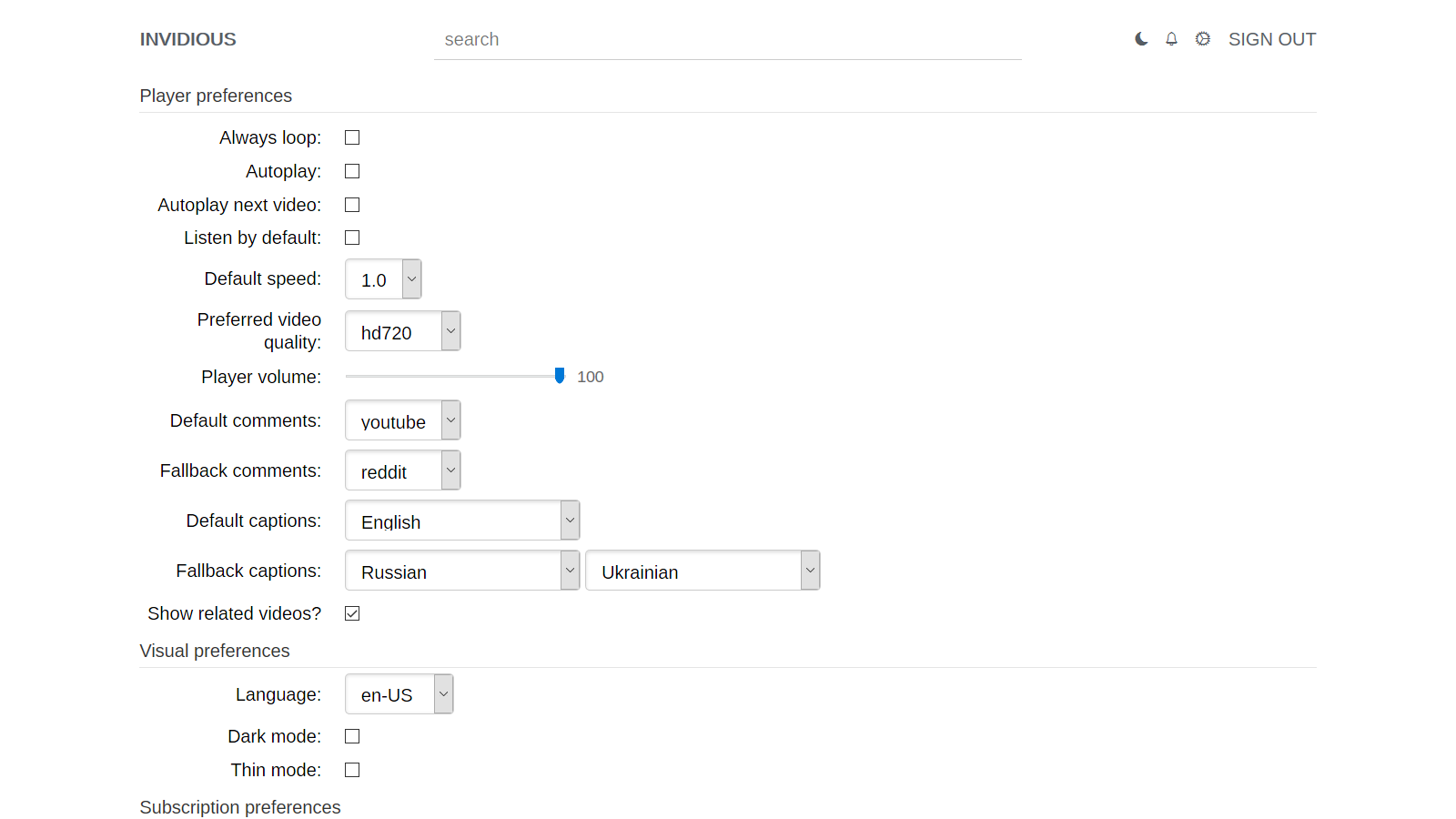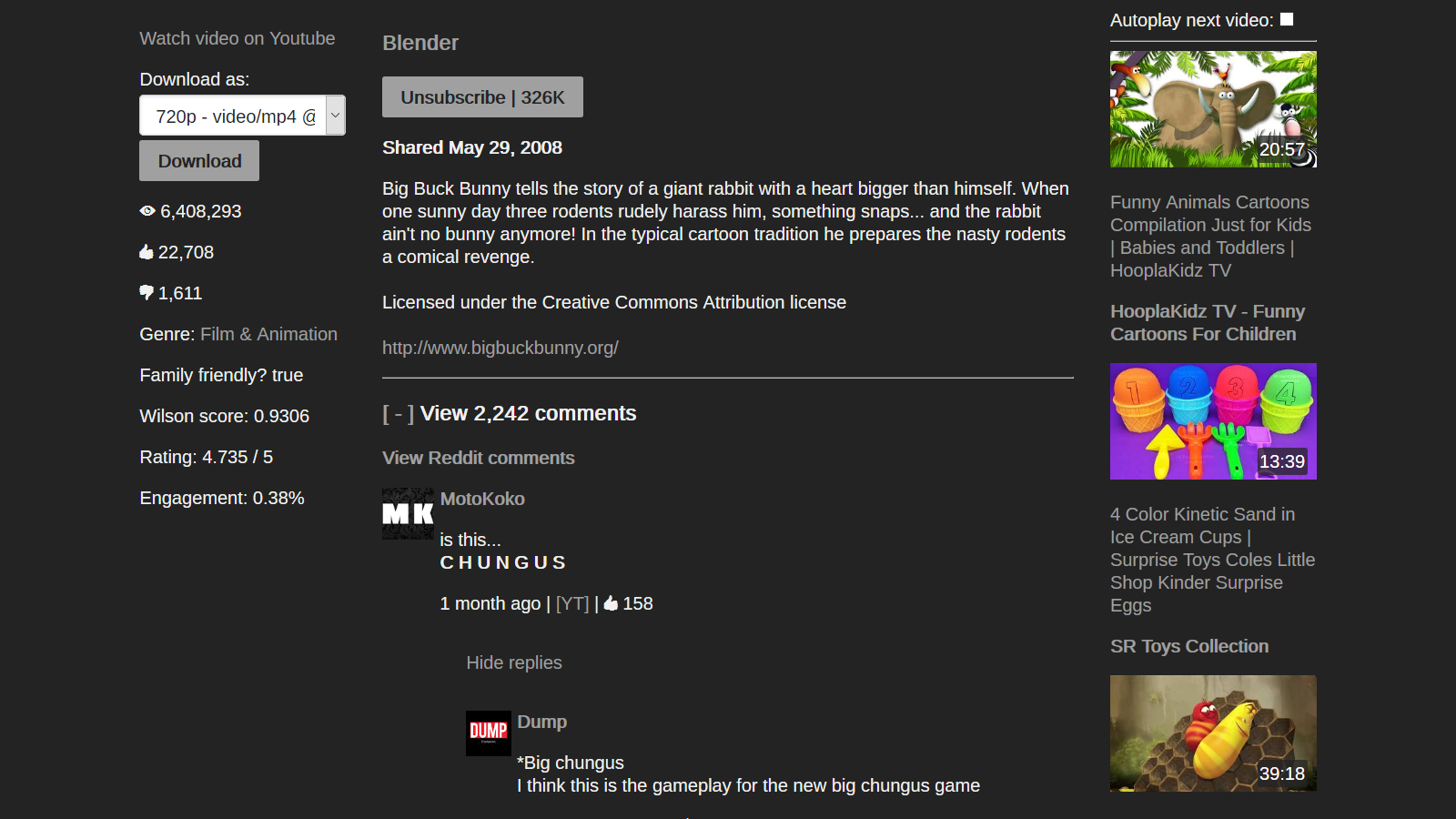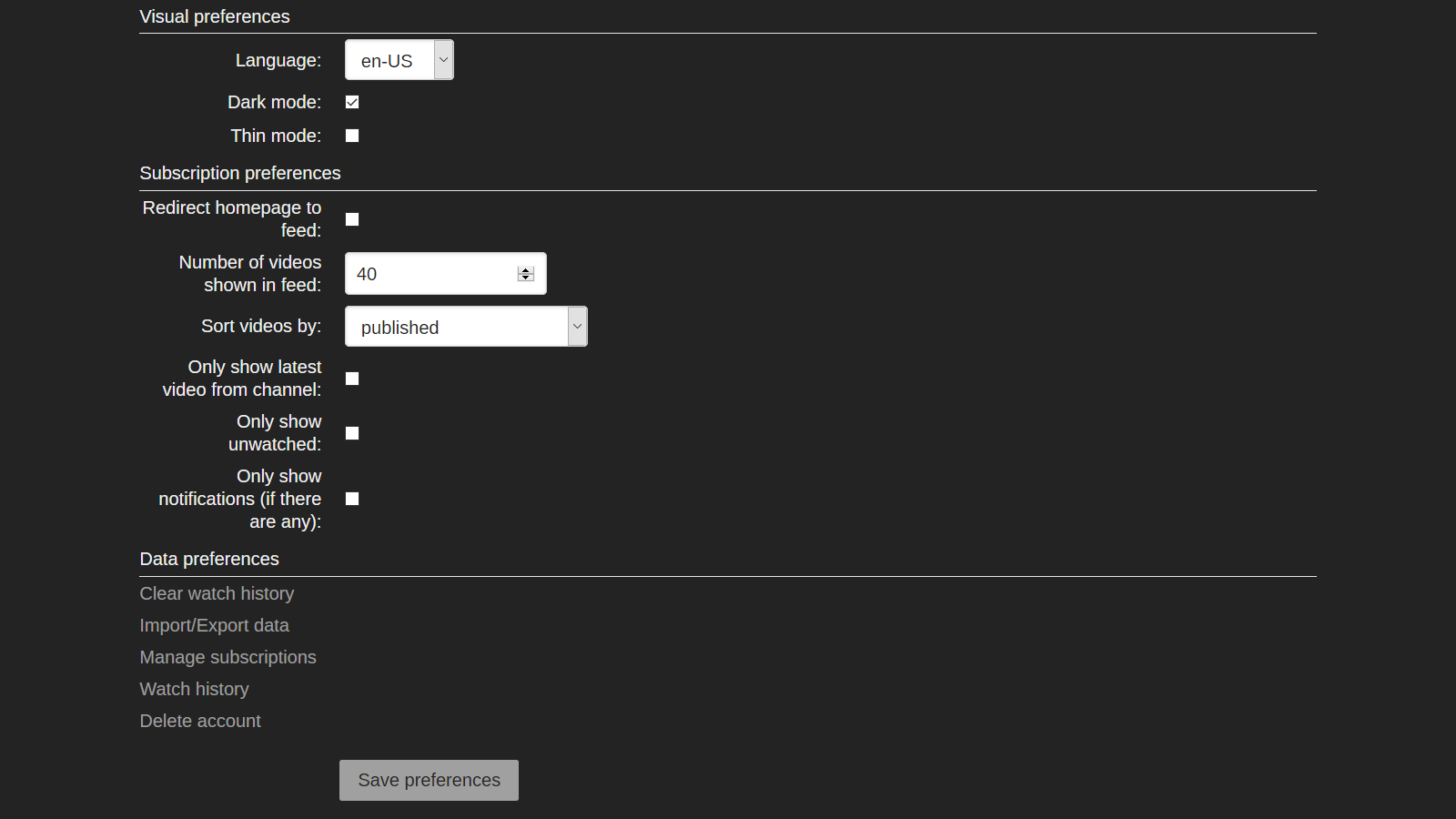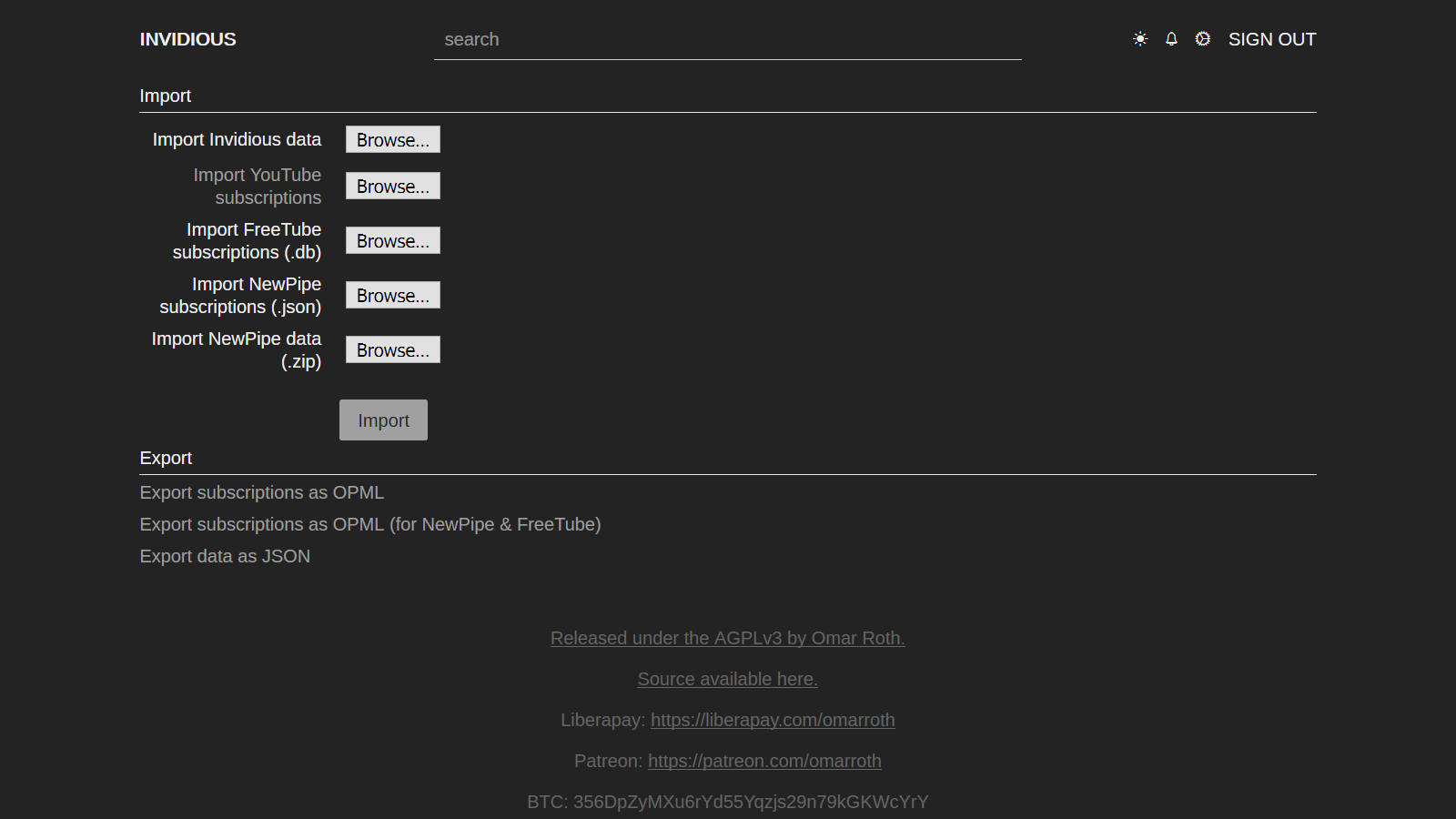| assets | ||
| config | ||
| docker | ||
| locales | ||
| screenshots | ||
| spec | ||
| src | ||
| .editorconfig | ||
| .gitignore | ||
| CHANGELOG.md | ||
| docker-compose.yml | ||
| invidious.service | ||
| LICENSE | ||
| README.md | ||
| shard.yml | ||
Invidious
Invidious is an alternative front-end to YouTube
- Audio-only mode (and no need to keep window open on mobile)
- Open-source (AGPLv3 licensed)
- No ads
- No need to create a Google account to save subscriptions
- Lightweight (homepage is ~4 KB compressed)
- Tools for managing subscriptions:
- Only show unseen videos
- Only show latest (or latest unseen) video from each channel
- Delivers notifications from all subscribed channels
- Automatically redirect homepage to feed
- Import subscriptions from YouTube
- Dark mode
- Embed support
- Set default player options (speed, quality, autoplay, loop)
- Does not require JS to play videos
- Support for Reddit comments in place of YT comments
- Import/Export subscriptions, watch history, preferences
- Does not use any of the official YouTube APIs
- Developer API
Liberapay: https://liberapay.com/omarroth
Patreon: https://patreon.com/omarroth
BTC: 356DpZyMXu6rYd55Yqzjs29n79kGKWcYrY
BCH: qq4ptclkzej5eza6a50et5ggc58hxsq5aylqut2npk
Onion links:
- kgg2m7yk5aybusll.onion
- axqzx4s6s54s32yentfqojs3x5i7faxza6xo3ehd4bzzsg2ii4fv2iid.onion
Alternative Invidious instances
Screenshots
| Player | Preferences | Subscriptions |
|---|---|---|
 |
 |
 |
 |
 |
 |
Installation
See Invidious-Updater for a self-contained script that can automatically install and update Invidious.
Docker:
Build and start cluster:
$ docker-compose up
And visit localhost:3000 in your browser.
Rebuild cluster:
$ docker-compose build
Delete data and rebuild:
$ docker volume rm invidious_postgresdata
$ docker-compose build
Linux:
Install dependencies
# Arch Linux
$ sudo pacman -S shards crystal imagemagick librsvg postgresql
# Ubuntu or Debian
# First you have to add the repository to your APT configuration. For easy setup just run in your command line:
$ curl -sSL https://dist.crystal-lang.org/apt/setup.sh | sudo bash
# That will add the signing key and the repository configuration. If you prefer to do it manually, execute the following commands:
$ curl -sL "https://keybase.io/crystal/pgp_keys.asc" | sudo apt-key add -
$ echo "deb https://dist.crystal-lang.org/apt crystal main" | sudo tee /etc/apt/sources.list.d/crystal.list
$ sudo apt-get update
$ sudo apt install crystal libssl-dev libxml2-dev libyaml-dev libgmp-dev libreadline-dev librsvg2-dev postgresql imagemagick libsqlite3-dev
Add invidious user and clone repository
$ useradd -m invidious
$ sudo -i -u invidious
$ git clone https://github.com/omarroth/invidious
$ exit
Setup PostgresSQL
$ sudo systemctl enable postgresql
$ sudo systemctl start postgresql
$ sudo -i -u postgres
$ psql -c "CREATE USER kemal WITH PASSWORD 'kemal';"
$ createdb -O kemal invidious
$ psql invidious < /home/invidious/invidious/config/sql/channels.sql
$ psql invidious < /home/invidious/invidious/config/sql/videos.sql
$ psql invidious < /home/invidious/invidious/config/sql/channel_videos.sql
$ psql invidious < /home/invidious/invidious/config/sql/users.sql
$ psql invidious < /home/invidious/invidious/config/sql/session_ids.sql
$ psql invidious < /home/invidious/invidious/config/sql/nonces.sql
$ exit
Setup Invidious
$ sudo -i -u invidious
$ cd invidious
$ shards update && shards install
$ crystal build src/invidious.cr --release
# test compiled binary
$ ./invidious # stop with ctrl c
$ exit
systemd service
$ sudo cp /home/invidious/invidious/invidious.service /etc/systemd/system/invidious.service
$ sudo systemctl enable invidious.service
$ sudo systemctl start invidious.service
OSX:
# Install dependencies
$ brew update
$ brew install shards crystal-lang postgres imagemagick librsvg
# Clone repository and setup postgres database
$ git clone https://github.com/omarroth/invidious
$ cd invidious
$ brew services start postgresql
$ psql -c "CREATE ROLE kemal WITH LOGIN PASSWORD 'kemal';"
$ createdb invidious -U kemal
$ psql invidious < config/sql/channels.sql
$ psql invidious < config/sql/videos.sql
$ psql invidious < config/sql/channel_videos.sql
$ psql invidious < config/sql/users.sql
$ psql invidious < config/sql/session_ids.sql
$ psql invidious < config/sql/nonces.sql
# Setup Invidious
$ shards update && shards install
$ crystal build src/invidious.cr --release
Update Invidious
You can see how to update Invidious here.
Usage:
$ ./invidious -h
Usage: invidious [arguments]
-b HOST, --bind HOST Host to bind (defaults to 0.0.0.0)
-p PORT, --port PORT Port to listen for connections (defaults to 3000)
-s, --ssl Enables SSL
--ssl-key-file FILE SSL key file
--ssl-cert-file FILE SSL certificate file
-h, --help Shows this help
-t THREADS, --crawl-threads=THREADS
Number of threads for crawling YouTube (default: 0)
-c THREADS, --channel-threads=THREADS
Number of threads for refreshing channels (default: 1)
-f THREADS, --feed-threads=THREADS
Number of threads for refreshing feeds (default: 1)
-v THREADS, --video-threads=THREADS
Number of threads for refreshing videos (default: 0)
-o OUTPUT, --output=OUTPUT Redirect output (default: STDOUT)
Or for development:
$ curl -fsSLo- https://raw.githubusercontent.com/samueleaton/sentry/master/install.cr | crystal eval
$ ./sentry
Documentation
Documentation can be found in the wiki.
Extensions
Extensions can be found in the wiki, as well as documentation for integrating it into other projects.
Made with Invidious
- FreeTube: An Open Source YouTube app for privacy.
- CloudTube: Website featuring pastebin, image host, and YouTube player
- PeerTubeify: On YouTube, displays a link to the same video on PeerTube, if it exists.
- MusicPiped: A materialistic music player that streams music from YouTube.
Contributing
- Fork it ( https://github.com/omarroth/invidious/fork )
- Create your feature branch (git checkout -b my-new-feature)
- Commit your changes (git commit -am 'Add some feature')
- Push to the branch (git push origin my-new-feature)
- Create a new Pull Request
Contact
Feel free to send an email to omarroth@protonmail.com or join our Matrix Server, or #invidious on Freenode.
You can also view release notes on the releases page or in the CHANGELOG.md included in the repository.
License
Invidious is Free Software: You can use, study share and improve it at your will. Specifically you can redistribute and/or modify it under the terms of the GNU Affero General Public License as published by the Free Software Foundation, either version 3 of the License, or (at your option) any later version.
